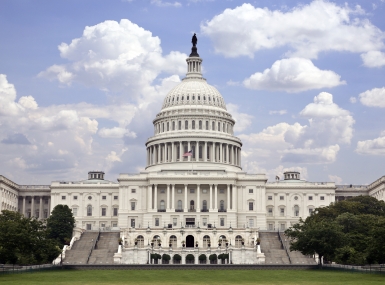Interior and Environment funding bill would reduce EPA regulations
Upcoming Events
Related News
House Appropriations Committee's FY19 Interior and Environment Appropriations bill provides roughly $35.25 billion in appropriations, equal to FY18 enacted levels
The House Committee on Appropriations released its FY 2019 Interior and Environment Appropriations bill, May 14, which funds, among other programs and federal agencies, the Department of the Interior (DOI), Forest Service, Environmental Protection Agency (EPA) and the Army Corps of Engineers (Army Corps). Overall, the bill would provide roughly $35.25 billion in appropriations, equal to FY 2018 enacted levels.
The package also includes various policy measures aimed at reducing regulations from EPA and other agencies.
Of particular importance to counties, provisions addressing the following programs and agencies are included in the bill:
PILT: DOI’s Payments in Lieu of Taxes (PILT) Program, which reimburses counties for forgone property tax revenue due to the presence of tax-exempt federal lands within their jurisdictions, would be funded at $500 million for FY 2019, $35 million above the president’s FY 2019 budget request, but $30 million below FY 2018 enacted funding levels. This reduction occurs because prior-year SRS payments will be deducted under the PILT formula now that SRS has been reauthorized. The reduced funding level will bring funding for FY 2019 in line with previous fiscal years.
EPA: EPA would be funded at $7.96 billion in the appropriations package, representing a decrease of $100 million below FY 2018, including a reduction of $228 million to EPA’s regulatory programs. The bill would also fully repeal the “Waters of the U.S. (WOTUS)” regulation, which was originally finalized in 2015. The 2015 WOTUS rule has been fraught with legal challenges and is currently undergoing revisions at EPA following an executive order by the president in late 2017 directing the agency to review and either rescind or rewrite the ruleThe bill also includes measures that would fund the EPA’s Clean Water and Drinking Water State Revolving Loan Fund at $2.6 billion and the Water Infrastructure Finance and Innovation Act (WIFIA) program at $75 million. As major owners, operators and consumers of local water resources and infrastructure, counties often use these programs to help build and maintain key water infrastructure projects. The bill also includes $40 million to clean up Superfund sites and spur economic development at these sites.
Forest Service: The U.S. Forest Service would be funded at $6.1 billion under this package, $3 billion of which would be allocated to fire suppression and prevention. Including these funds, the Interior and Environment Appropriations measure would provide $3.9 billion for wildland firefighting and prevention activities, fully funding the 10-year average for DOI and Forest Service wildfire suppression costs. Further, $500 million is included specifically for Forest Service suppression operations, while $655 million would be provided for hazardous fuels management, an increase of $30 million above FY 2018 levels.
BLM: The Bureau of Land Management (BLM) would receive $1.4 billion in the appropriations package, an increase of $55 million over FY 2018. This funding includes $60 million for sage grouse conservation efforts, and a $6.2 million increase in funding to promote energy and mineral development on BLM lands. Language is also included that would prevent the listing of the greater sage-grouse under the Endangered Species Act.
NPS: The National Park Service (NPS) would be funded at $3.25 billion for an increase of $53 million over FY 2018, and would increase funding to address deferred maintenance on NPS lands by $175 million. Of this increase, $40 million would be directed toward maintenance, repair and rehabilitation projects, while $135 million would be used for deferred maintenance of NPS facilities.
LWCF: Additionally, the bill would provide $360 million for Land and Water Conservation Fund (LWCF) programs. State and local recreation and battlefield preservation programs would be prioritized under the bill, with 62 percent of this funding directed to NPS State Assistance, Forest Legacy, American Battlefield Protection and Highlands Conservation Act programs.
Attachments
Related News

U.S. Congress passes reconciliation bill: What it means for counties
On July 3, the U.S. Congress passed sweeping budget reconciliation legislation.

White House signs executive orders to advance nuclear power
On May 23, President Trump signed four executive orders focused on expanding the nuclear energy industry. The executive orders aim to position nuclear power as a key contributor to energy reliability, economic growth and national security — especially as artificial intelligence, advanced manufacturing and military operations increase demand for stable, high-density power sources.

U.S. Supreme Court issues unanimous decision in landmark National Environmental Policy Act case
On May 29, the U.S. Supreme Court issued a unanimous decision in Seven County Infrastructure Coalition v. Eagle County, Colorado that will reshape requirements for National Environmental Policy Act (NEPA) environment impact statements.